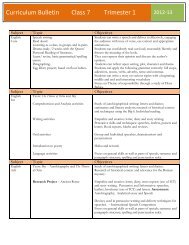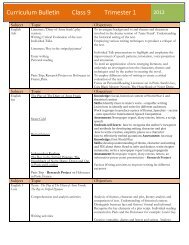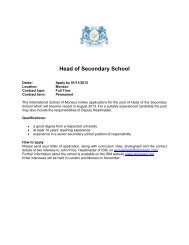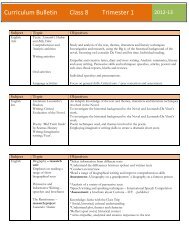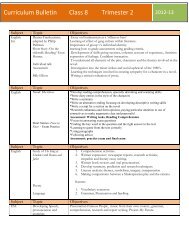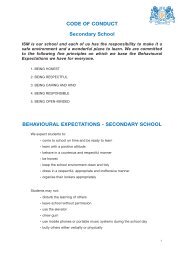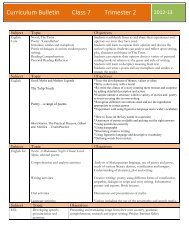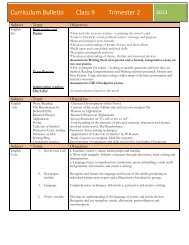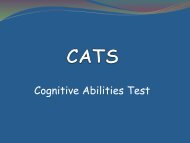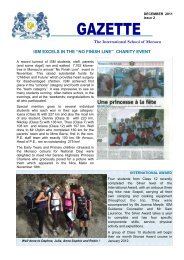Handbook Primary - The International School of Monaco
Handbook Primary - The International School of Monaco
Handbook Primary - The International School of Monaco
Create successful ePaper yourself
Turn your PDF publications into a flip-book with our unique Google optimized e-Paper software.
On Admission<br />
Health<br />
On admission, all students are required to complete the school’s yellow medical<br />
questionnaire, as well as a blue medical form, which is required for the Monégasque medical<br />
authorities. Photocopies <strong>of</strong> each child’s up to date vaccination certificates must be attached.<br />
Parents are reminded that vaccination against diphtheria, tetanus and polio is compulsory in<br />
<strong>Monaco</strong>. BCG vaccination against tuberculosis is also requested. Parents should obtain a<br />
medical certificate from their doctor if any vaccinations are contra-indicated.<br />
Medical Visit<br />
During the school year new students and certain other classes, undergo a medical<br />
examination carried out by a doctor and nurse from the “Inspection Médicale”. This is a brief<br />
routine physical check-up and a brief report is then sent home to the parents. Parents are<br />
informed well in advance, <strong>of</strong> the dates <strong>of</strong> these visits. <strong>The</strong>se now take place on school<br />
premises with ISM staff present.<br />
Emergency Card<br />
An Emergency Card with the parent’s contact numbers, the names <strong>of</strong> further contact persons<br />
and other important information about the child, is filled in at the time <strong>of</strong> each child’s<br />
admission to the school and updated at the beginning <strong>of</strong> each school year. Parents are<br />
responsible for informing the school if any <strong>of</strong> this information changes during the school year.<br />
Medication<br />
<strong>School</strong> policy does not allow school staff to dispense medicine to students without written<br />
consent from the parents. Any medicine coming to school must be clearly labelled with the<br />
child’s name and prescribed dosage. No responsibility can be accepted if a dose is missed.<br />
Asthma inhalers must be marked with the child’s name and handed to the class teacher for<br />
safe-keeping.<br />
Illness<br />
Students who are obviously not well, who have sickness or diarrhea or who have fever,<br />
should not be sent to school. In the case <strong>of</strong> communicable diseases, the school should be<br />
notified immediately, so that other parents can be informed.<br />
First Aid Training<br />
All <strong>of</strong> our staff are trained to administer the basics in first aid. Several <strong>of</strong> our staff are fully<br />
trained in this area and will be contacted to help, should an emergency arise.<br />
First Aid and Emergencies<br />
<strong>The</strong> school will administer whatever first aid measures seem necessary if a child is sick or<br />
injured at school. Parents will be notified immediately or at the end <strong>of</strong> the school day, if this<br />
is deemed more appropriate. If there is any concern, an ambulance will be called immediately<br />
and the injured or sick child will be taken to hospital, accompanied by a member <strong>of</strong> staff who<br />
knows the child. <strong>The</strong> parents will be alerted to meet the ambulance at the hospital. If neither<br />
<strong>of</strong> the parents or the parents’ emergency contact person can be contacted, the school will<br />
proceed with whatever measures seem necessary.<br />
29




